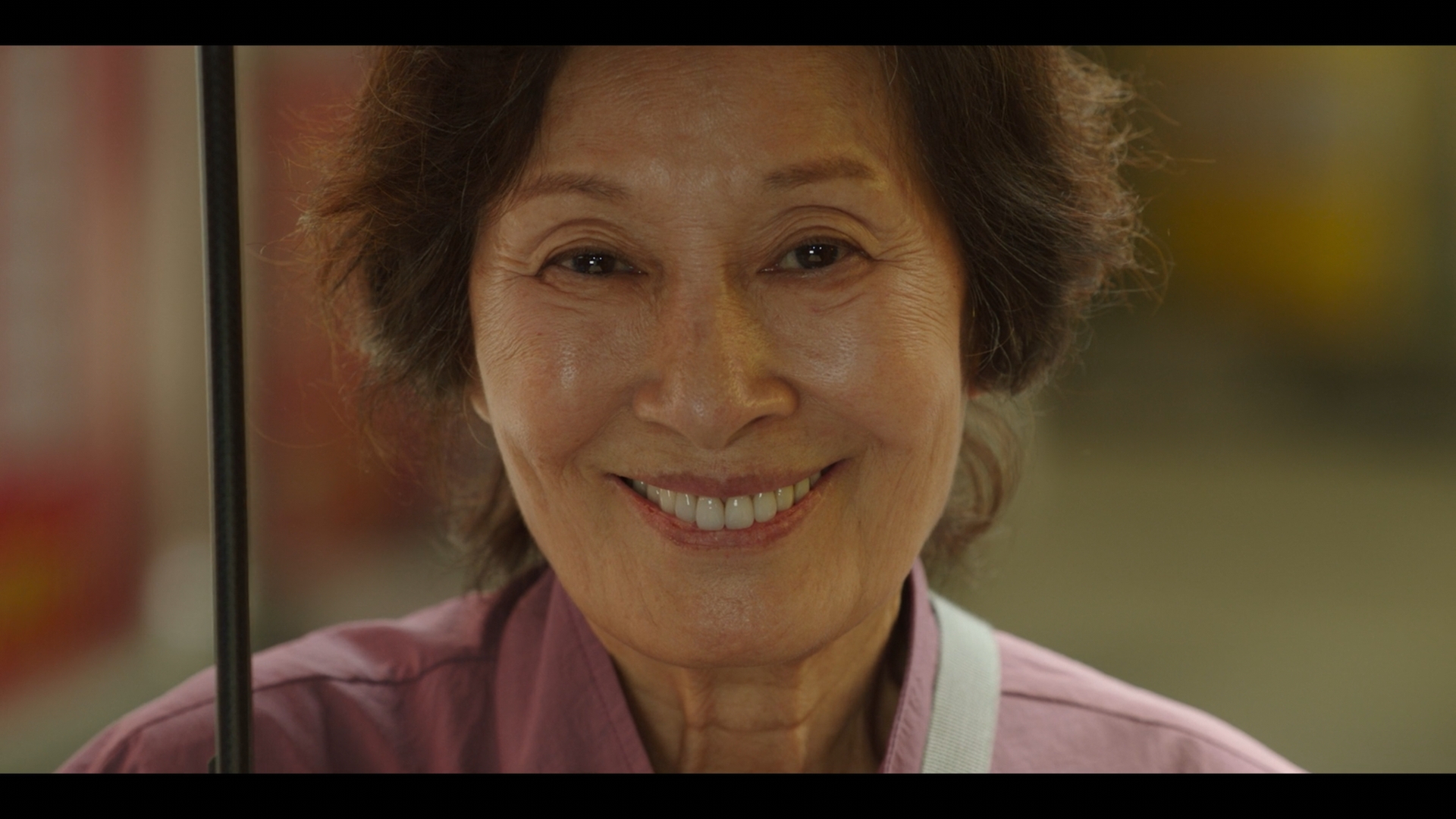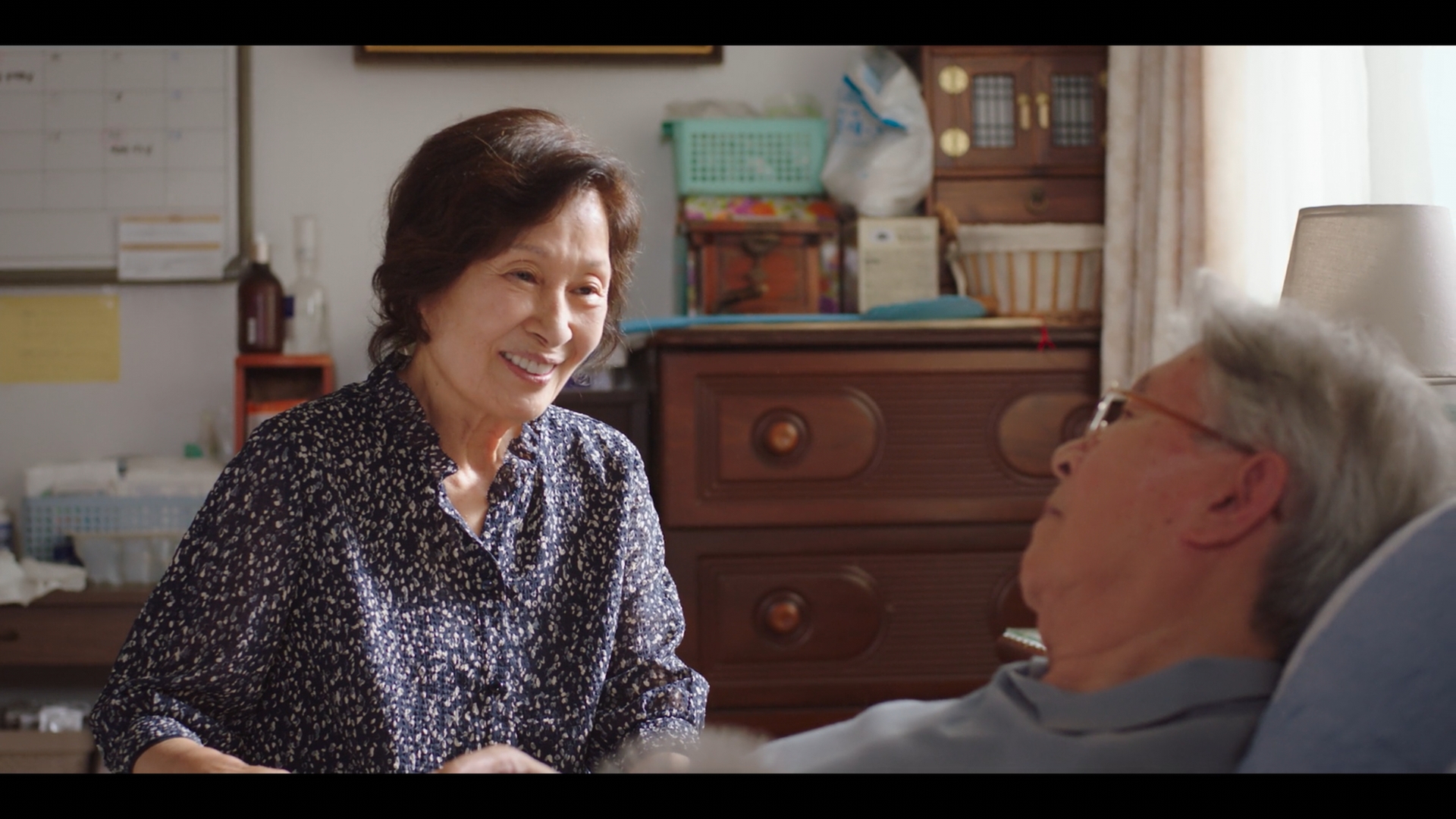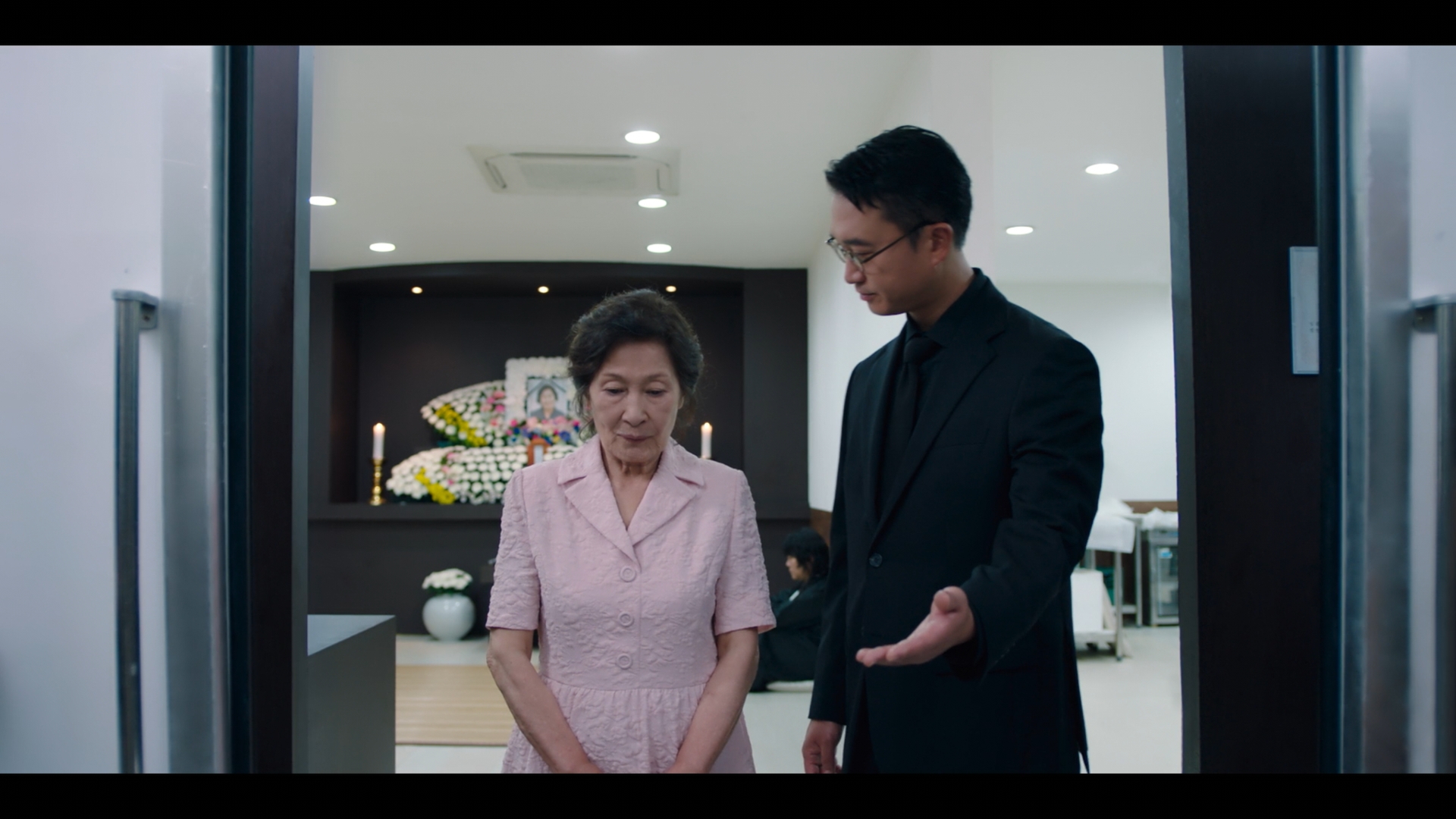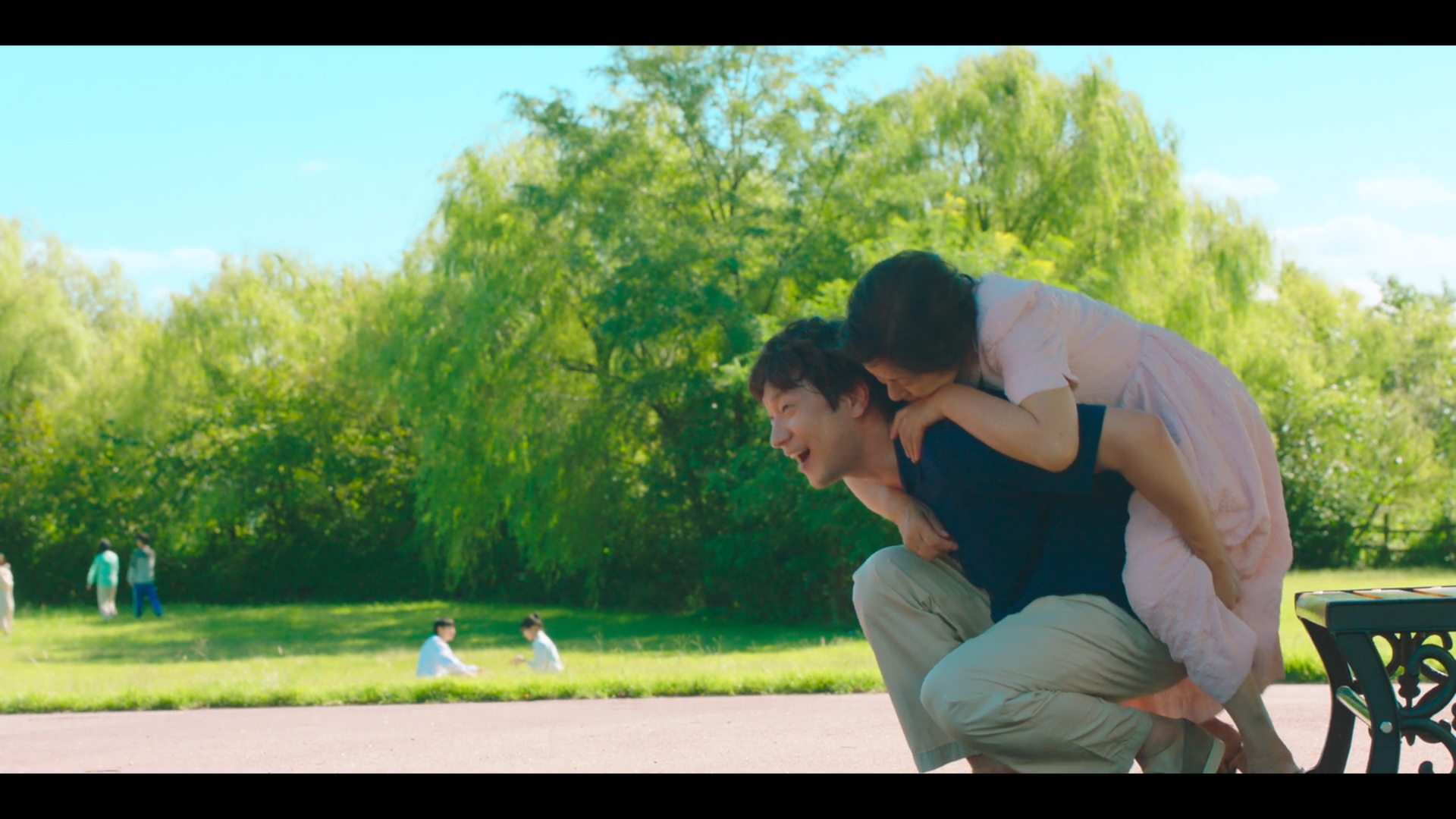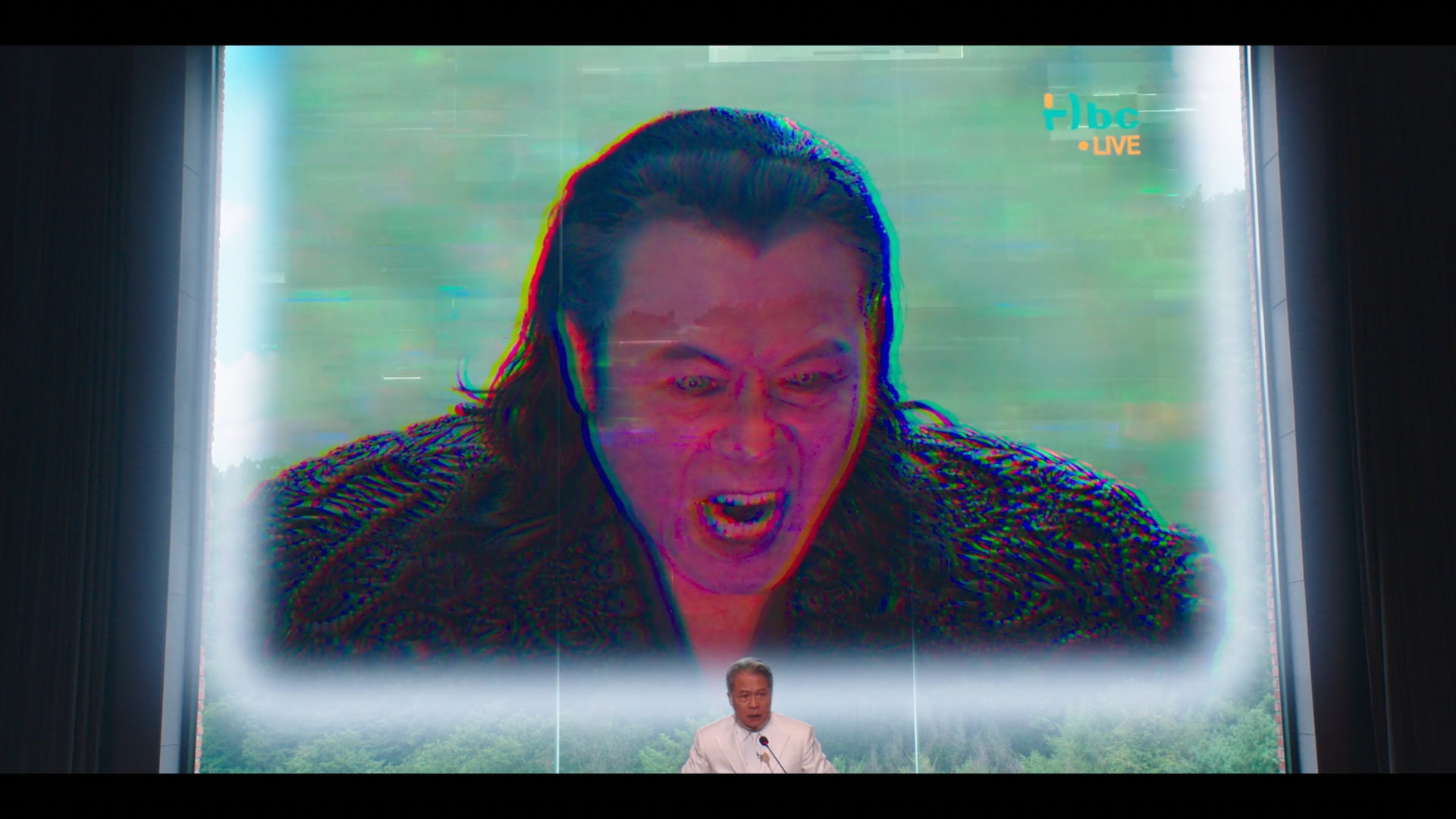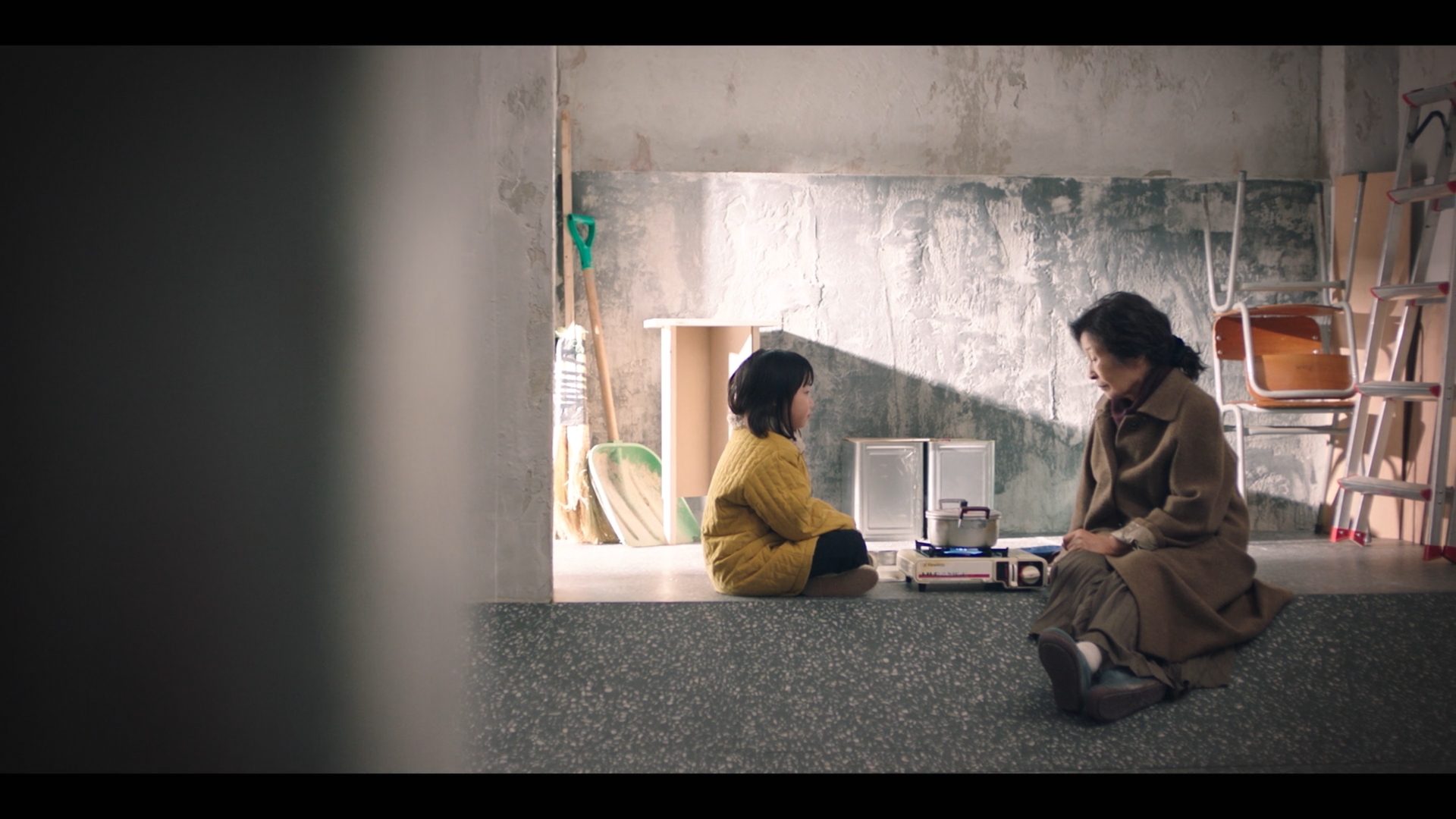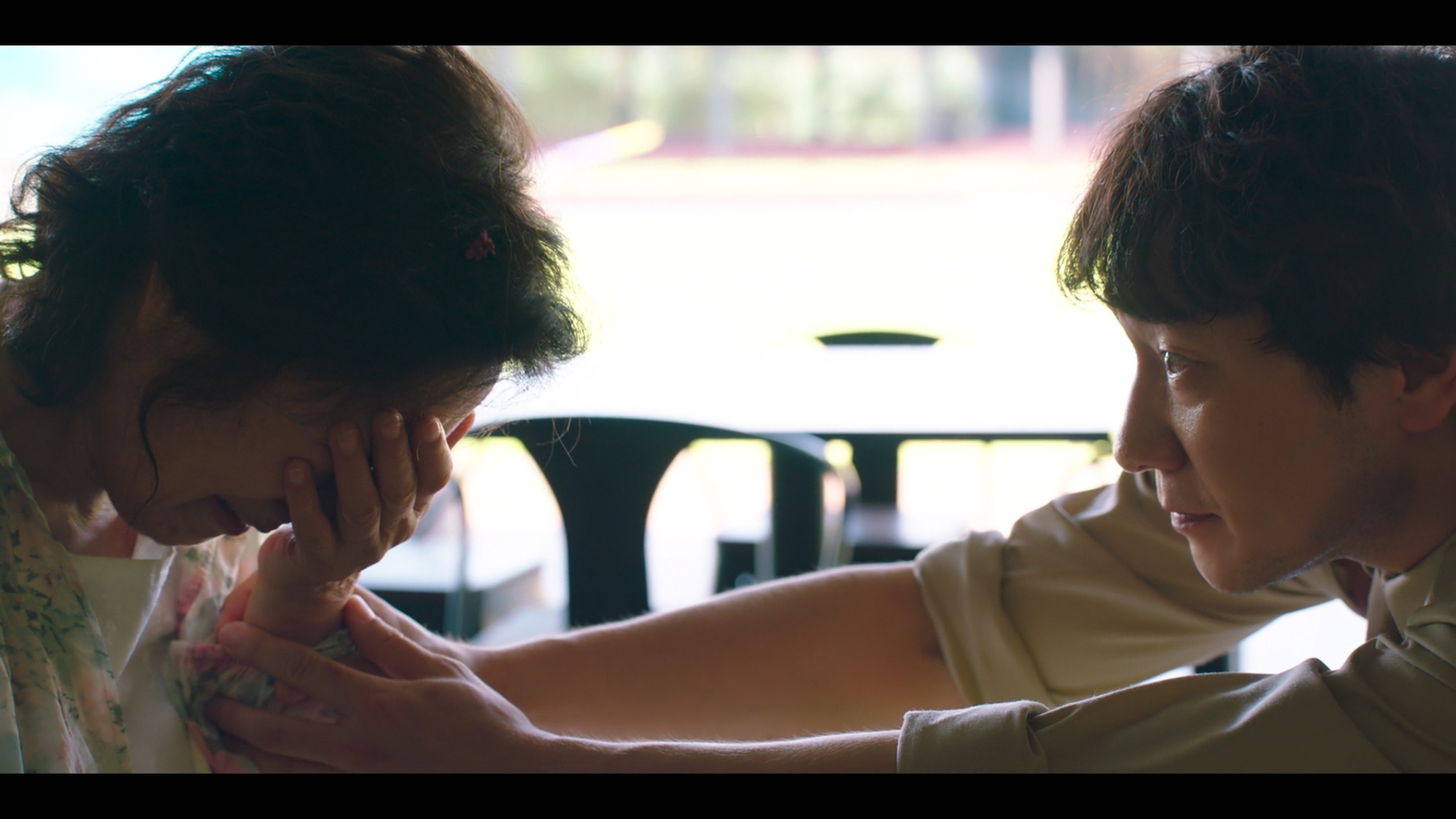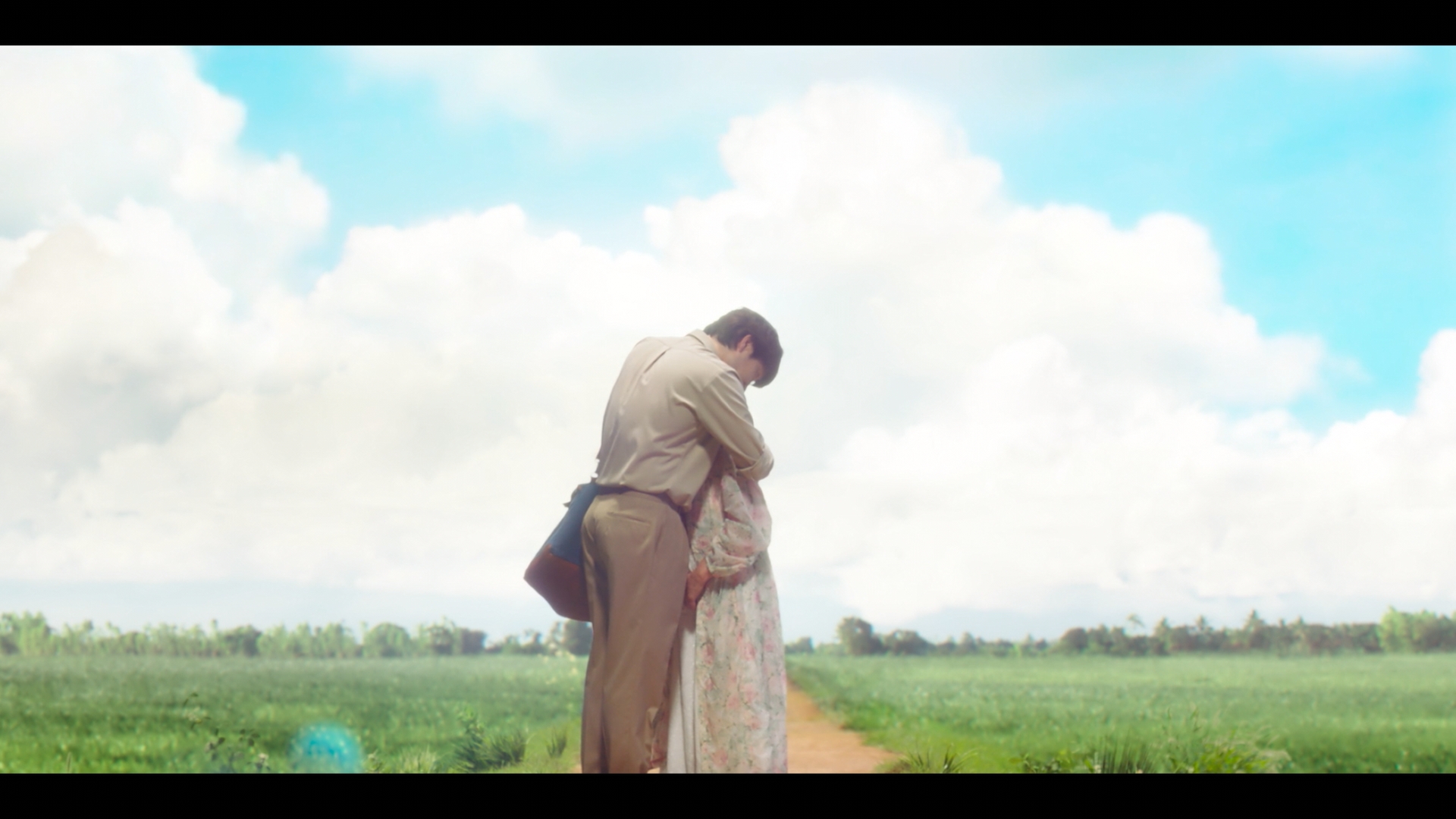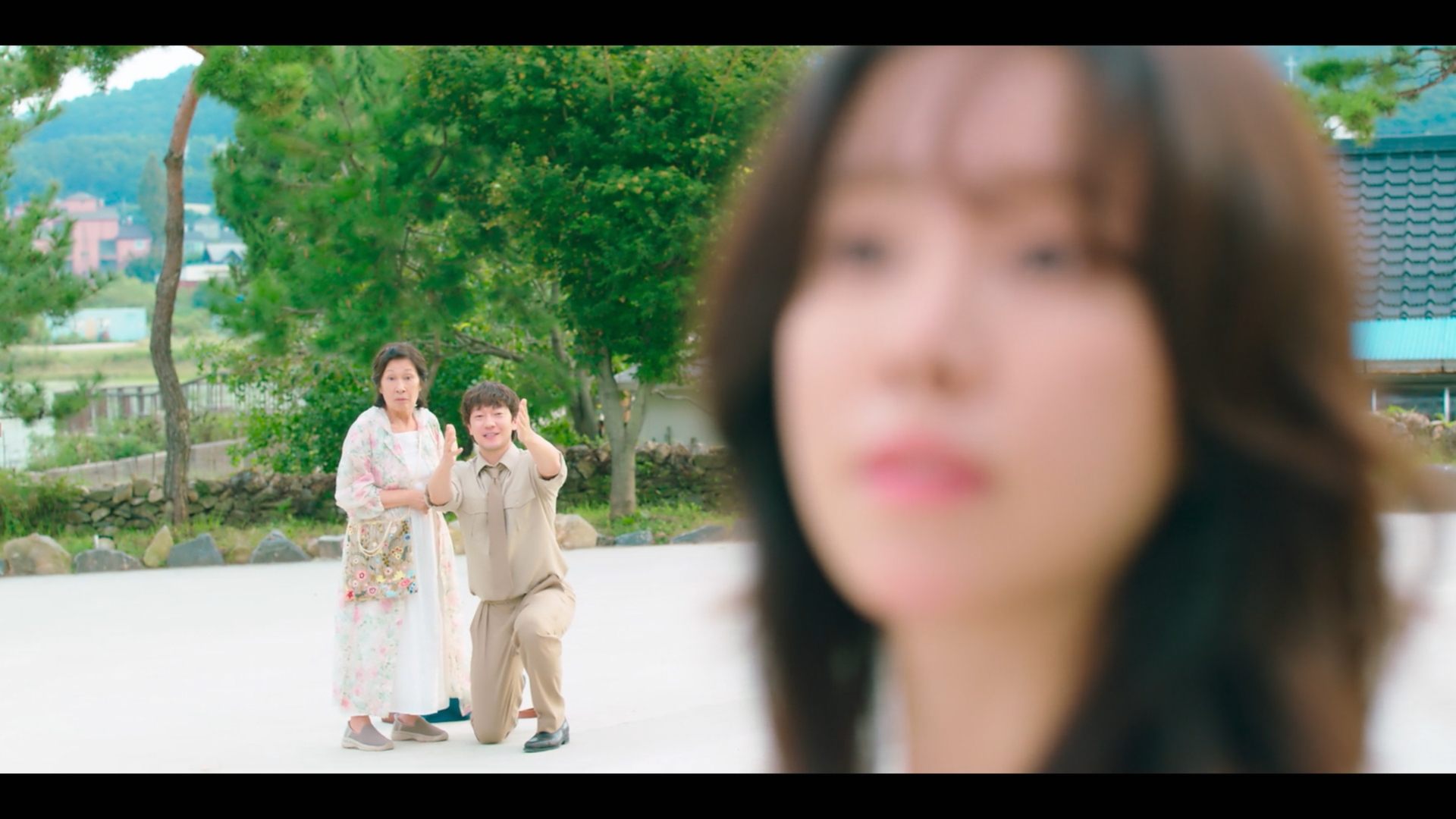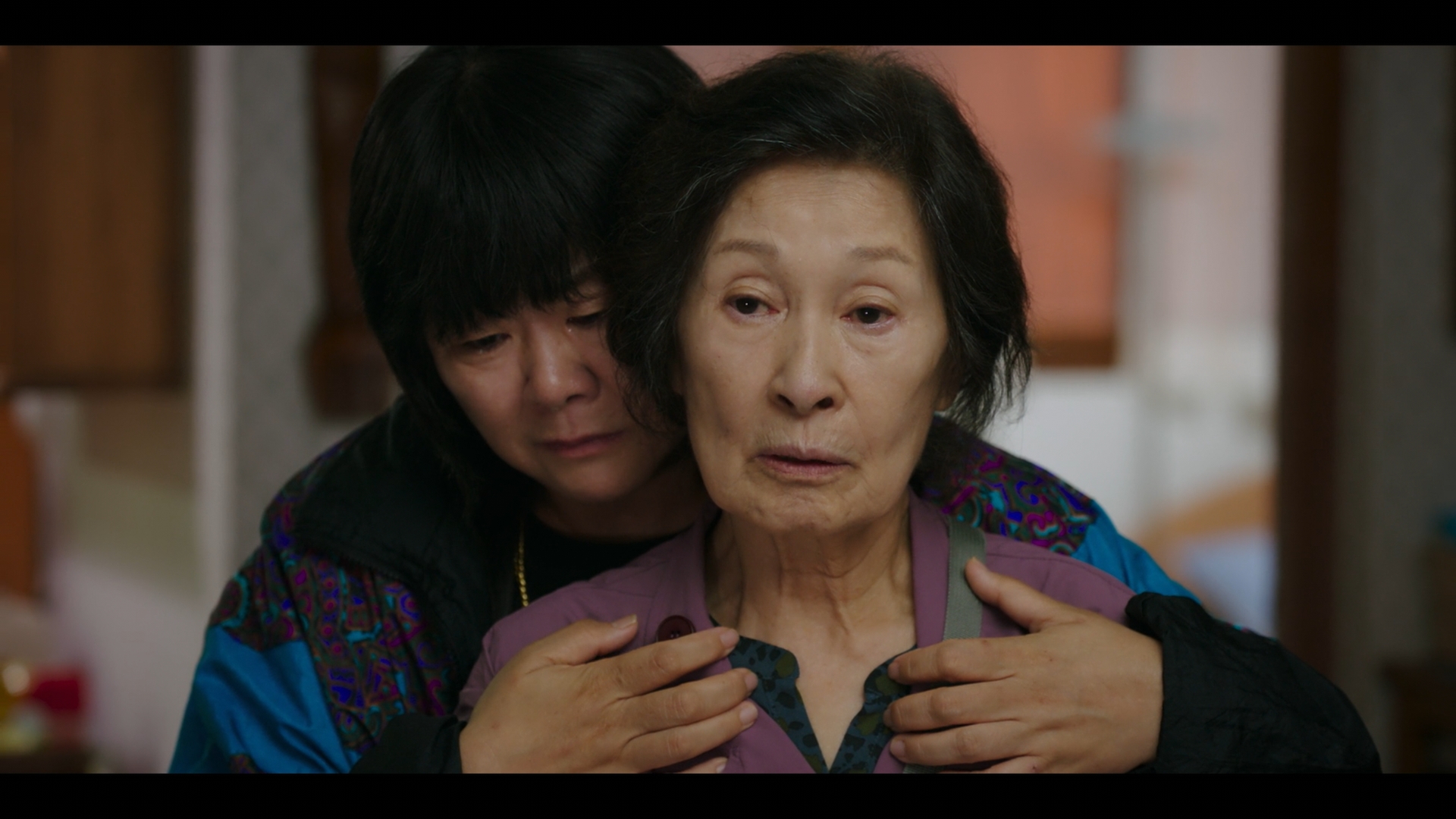Heavenly Ever After: Episodes 1-2 » Dramabeans
Heavenly Ever After: Episodes 1-2
by lovepark
Heartfelt and funny, Heavenly Ever After makes a strong first impression with a creative premise and lovable characters. A woman who believed she was bound for hell ends up in heaven, but her second chance at life comes with an unexpected twist. What exactly does the future hold for our unconventional heroine, and will she achieve her happily ever after?
EPISODES 1-2
The show opens to a gambling addict hounded by loan sharks, but these burly gangsters have to wait their turn since another shark is here to collect: our protagonist LEE HAE-SOOK (Kim Hye-ja). Contrary to her genial features, Hae-sook is a heartless business woman with a tenacious streak. The amounts she lends may seem paltry – a couple hundred thousand won here and there – but around these parts, her infamy is renowned.
Armed with an umbrella and her muscle LEE YOUNG-AE (Lee Jung-eun), Hae-sook remains unfazed by the snide comments, dirty looks, and buckets of water thrown her way. Not even death can forgive her debts as she collects what is due, but the callous woman the world sees isn’t all there is to her. Deep down, Hae-sook was once a timid young lady met with tragedy, and despite years of hardening her heart, that loving soul still exists when she’s around the right people.
Next to her husband GO NAK-JUN (Park Woong), Hae-sook transforms into a giggling wife, and though she cared for him for nearly sixty years since his accident that left him paraplegic, their relationship remains jovial and bright. So much so, in fact, that poor Young-ae smacks herself with a pan, preferring to faint than to hear their lovey-dovey confessions. However, underneath the jokes and smiles, a current of sadness flows gently through their relationship, and while its presence may not be overbearing, a tinge of guilt and regret remains ingrained in their interactions.
As death looms ever closer to the elderly couple, Nak-jun admires his wife, calling her beautiful. He tells her that she was pretty when she was young, but as the days go by, his love for her grows as does her beauty. Hae-sook responds in kind, saying that he looks the most handsome now, and this tender conversation is the last we see between them before Nak-jun passes. At first, Hae-sook yells at him for pulling another prank, but in reality, she knows her beloved is gone no matter how much she wishes otherwise.
With nothing left to tie her to this world, Hae-sook waits for death and sets up Young-ae on a blind date so she won’t be alone after she leaves. Rather than feel grateful for the pretty dress and handsome guy, Young-ae makes a scene and cries her heart out. She understands that Hae-sook is sad but why must she try to leave her so soon. Her tears move Hae-sook to live a little longer, and once she teaches her apprentice her final trick of the trade, she follows after her husband a year later.
At her funeral, a grim reaper (special appearance by Jo Woo-jin) appears to pick her up and waits with Hae-sook for her subway to the afterlife. She asks him if he saw her husband by any chance, and he passes along his message that he walked to the next life on his own two feet. Once the train arrives, Hae-sook bows to the surly reaper, and he returns the gesture. It’s a simple addition to a humorous interaction but one that highlights Hae-sook’s core nature. She might be foul-mouthed and easily annoyed, but she acts with decorum and treats others with dignity even when they don’t always give her the same courtesy.
The subway car Hae-sook enters is filled with older people as well as a few younger folks and even a child. Most sit nervously as they approach their first stop, and the light disappears outside as hands start banging on the windows. This is hell, and all passengers bound to this place are flung out of their seats and into the darkness. Unlike the others, Hae-sook assumes this is her stop and tries to get up, but her butt remains glued down to her surprise.
After the doors close, Hae-sook realizes that she is going to heaven, and she disembarks with the rest to join the queue into the afterlife. The first test is to get through a detector as the heavenly workers explain that all entrants must leave their stuff behind. From the snippets we see, it seems the items reflect people’s regrets – a mother’s bank accounts for her orphaned children and a firefighter’s mask for the girl he couldn’t save – but Hae-sook has nothing in her possession, making her even more anxious about her situation.
The workers, though, don’t seem to pay her any heed as they usher her to her next destination: a consultation before entering heaven. The worker explains to Hae-sook that she gets to decide who to live with under a few stipulations – she chooses her husband who also chose her – and she gets to pick the age she wants to be. Hae-sook immediately says twenty-five (the age she met her husband), but at the last second, she remembers their conversation. She amends her answer to eighty, and the consultant triple-checks with her since she cannot change it later.
For the rare individuals who choose to be eighty and over, heaven equips them with a narration button that says what they’re thinking aloud. As soon as Hae-sook clicks it, the narrator reveals her desires – a steamy reunion with her husband – and one magic trick later, our heroine lands in a field inside a present. All she has to do now is follow her heart, quite literally, and it leads her to a house with her and her husband’s name etched in the front.
Hae-sook’s apprehensions vanish as she enters the yard to see her beloved again, but the man who exits the door is a much younger version of Nak-jun (Sohn Seok-gu). Adding insult to injury, he doesn’t instantly recognize her and then gasps as the realization hits him. Hae-sook curses under her breath, and a purple grape falls from the sky, unbeknownst to either of them.
After getting over the initial shock, Nak-jun excitedly takes Hae-sook’s hand and shows her that he can run now. He even offers to give her a piggyback ride, and while he thinks they look like a cute couple, her inner monologue calls them a mother and son pairing. Upset over her age and the fact that Nak-jun doesn’t even remember calling her beautiful, Hae-sook thinks she came to heaven by mistake since everything “good” about this place only makes her feel uncomfortable and misplaced.
Nak-jun tries to cheer up his wife since he loves her all the same, but from the towel she used to cover up the mirror, the issue may be her lack of self-acceptance and worsening self-consciousness. Especially in a world absent of people like her, it makes sense then that Hae-sook wants to go back to her twenties and mistakenly asks the community center president (Cheon Ho-jin) for a re-do.
The glowing man with the booming voice, though, is not God, and during orientation, it becomes clear that this version of the afterlife is more akin to “not hell” rather than paradise. The center president warns the new inhabitants that they don’t have super powers or instantaneous healing, so any physical constraints that bound them in the living world apply to them here, too. Furthermore, one’s place in heaven is not guaranteed, which means if someone does enough bad deeds (fighting, swearing, etc.), they can be dragged to hell. The president’s face flickers to a more demonic visage as he tells the crowd that they are always watching, and Hae-sook fidgets with worry.
After the meeting, Hae-sook verifies with Nak-jun that people mistakenly enter heaven all the time, but he assures his wife that she belongs here, no doubt in his mind. To prove it, he tells her to buy a meal with “good deeds” (the currency used in heaven), and to her delight, it works. It seems, at least for a moment, that Hae-sook is adjusting to her new surroundings, but as she shares an intimate moment with her husband, a woman in black appears out of nowhere and promptly vanishes.
While Hae-sook tosses and turns in bed that night, she hears the wails of Young-ae from below as she sits in the apartment all alone. When she was a little girl, Hae-sook barged into her home, looking for her debt-ridden dad. She threatened to stay until she got her money back, but the older woman’s presence was actually a welcome change for the neglected girl. Hae-sook heated up her home and her heart, and when her dad returned only to hit her, Hae-sook intervened and essentially adopted her. Hae-sook was all Young-ae had, and now that she is gone, Young-ae is lost.
Back in heaven, Hae-sook attends her second day of orientation, but instead of going to the meeting, she notices a group with two older people like her and follows them. The worker leading this particular class scolds a few individuals for pooping and peeing in the streets, and while Hae-sook finds their behavior odd, she hasn’t yet put the clues together. It isn’t until they go outside to meet their “owners” that Hae-sook realizes the truth, and these people shift into their canine forms as they reunite with their loved ones.
Having learned that animals can look like humans, too, Hae-sook crosses paths with the woman in black again and finally recognizes her cat Sonya. As they reconnect, even her cat is confused to see her looking so old, and Hae-sook finally breaks. She confronts Nak-jun for his empty words and cries about missing her youth. She devoted her life to him once already, and now she wasted her second chance because she trusted him.
Feeling guilty for not remembering, Nak-jun promises to take care of the situation, but alas, the staff inform them that they cannot turn someone young again. Hae-sook asks if the reverse could happen, then, and Nak-jun blurts out his true feelings, saying that it wouldn’t be fair. When his wife grills him about what he means, Nak-jun sheds a tear and agrees to look older, but the staff lets them know that he can’t change, either.
On their walk home, Hae-sook tells Nak-jun that she is glad he stayed young since she fell for his face, but her attempts to lighten his guilt only make him feel more selfish. He apologizes for ignoring her plight even though he knew what she endured to take care of the family, and though she tried to shield him from the truth back when they were alive, Nak-jun heard it all from his caregiver. He felt like he didn’t even have the right to cry and prayed every day for his death in order to lessen her burdens.
Hae-sook comforts her husband, telling him that she doesn’t regret a thing since she married him for his looks, and he chuckles at her joke. As they finally hug for the first time since their deaths, Hae-sook tears up and says that she really is in heaven.
Meanwhile in the living world, Young-ae moves around in a daze and stumbles across a medium who claims to commune with the dead. It’s obvious that the lady is fake with her terrible impression of Hae-sook, but in her current state, Young-ae believes her lies and shouts that she will go to her side. We then hear a loud crash, and the implications of what happened next is clear.
This terrible chain of events, though, remains oblivious to Hae-sook who enjoys a stroll back home with Nak-jun. As they reach their house, he tells her that he prepared something special, and Hae-sook’s narrator hopes it’s something more physical than a hug. Unfortunately, when he does his big reveal, a mysterious lady (Han Ji-min) stands at their door and rushes towards Nak-jun to hug him. Assuming the worst, Hae-sook grabs the other lady by the hair, and when Nak-jun tries to stop her, she grabs him, too. She curses at her husband, and from the sky, three more grapes fall down.
I absolutely adore Hae-sook. She’s fun and brazen without being rude, and I love how her internal conflict is complex and richly layered. Her being old in heaven could have been treated as a gimmick to simply garner laughs, but already, the show is exploring so many topics and emotions regarding her condition. The issue isn’t about whether Nak-jun could see beyond the physical (he clearly loves his wife no matter her age) but rather about Hae-sook and her self-image. It also serves as a larger metaphor of how society pushes out certain people like the elderly, and even after death, people aren’t truly free to be themselves. While she was alive, Hae-sook never saw herself kindly, and now that she is in a world where she doesn’t feel like she belongs, her appearance acts as a manifestation of those doubts and alienation.
Though Hae-sook might not see her own worth at times, thankfully those around her notice and appreciate her warmth and love. Young-ae is such a sweetheart, and it makes so much sense why the loss of Hae-sook hit her so hard. It wasn’t just about losing a mother-figure but the fact that Hae-sook seemed to not care about leaving her behind. As a result, when Young-ae heard that Hae-sook still needed her, she jumped at the chance to help. As for Nak-jun, I found both actors’ portrayals charming, capturing the playfulness of the character as well as his unwavering adoration for his wife. Despite the scars he has, Nak-jun remains bright, and seeing all the things he prepared in a year while waiting for her was bittersweet. It captured a lifetime of conversations and dreams as well as his past and present guilt. While he might have wanted a second chance at life with his wife from the beginning, he still loves older Hae-sook, and I’m glad the show kept that part of him consistent no matter the ages.
The depiction of heaven was creative with enough similarities to our world to make it feel familiar yet punctuated with well-timed distinctions to remind the viewers that this is the afterlife. I found the automation, in particular, funny as well as terrifying since the iron cage of bureaucracy follows us even after death, and the subtle (as well as overt) unease resulting from it permeates throughout the setting suggesting that something isn’t right. The threat of hell is sure to keep people in line, but what’s the end goal? If the president’s speech about living life with no regrets is true and that their time is not eternal, do the residents die again? Hopefully as the show continues, we’ll learn more about this world and the rules that govern it.
RELATED POSTS

